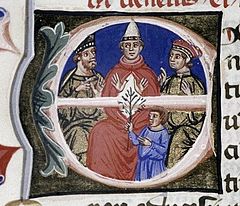The patience of a saint? Henry, you pretty much had it!
In order to rebuild the fabric of the English nation!
Henry needed to restructure the country’s administration!
Henry was the sovereign of a sprawling empire which stretched from the Pyrenees in the south, to Cumbria in the north and later to the Shannon in the west. Nevertheless, his initial priorities lay in England. The king now had to restructure the government of England after the years of upheaval under Stephen. Henry would build on the solid foundations laid by his grandfather, and of course in this endeavour, it was important to have men of talent at hand.
A man of great thought and reason!
In short, a man for each and every season!
When Henry was looking for a suitable person for the chancellorship, Archbishop Theobold recommended his assistant, one Thomas Beckett. A flamboyant character, but an immensely able man who in modern parlance, would be described as a ‘problem solver, par excellence’. Thomas proved himself to be an indispensable servant to the king and despite Thomas being fifteen year’s Henry’s senior, the two men became close friends.
Thomas Beckett.

In 1162, Henry appointed his friend as Archbishop of Canterbury. However a dispute soon arose which would destroy their friendship and have truly fatal consequences. In medieval times, the Church were allowed to try clergy accused of breaking the law in their own courts rather in the king’s courts. This often resulted in priests and others who worked for the Church, receiving much more lenient punishments than they would had they been tried in the King’s courts. Indeed the king was told of clergymen committing serious felonies such as rape and murder. However their punishments had been extraordinarily mild. Henry was enraged at what he regarded as a dreadful case of double standards and demanded that any member of the clergy found guilty of an offence be subject to the same penalties as ordinary people.
If a priest is caught!
He shall be dealt with in the same way as an ordinary person in the King’s court!
To Henry’s great surprise and anger, Thomas disagreed, and stated that the king had no right to interfere in the affairs of the Church. In 1164 a council of clergy approved Henry’s position in a document, the Constitutions of Clarendon. The Constitutions of Clarendon stated that:
‘The ordinary criminal suffers amputation, mutilation
and public humiliation’!
‘For too long the monkish rogue has suffered only a mild inconvenience and aggravation’!
A bitter dispute developed because Beckett eventually refused to accept the document and he was forced to flee to France in 1165. Under pressure from Pope Alexander, Henry allowed Beckett to return in 1170 and it appeared that perhaps the quarrel could be put to rest.
Pope Alexander III (died 1189).

Instead it stoked the flames of their deep disagreement to an unimaginable degree. While Beckett had been in France, Henry had had his eldest son crowned junior King of England. Due to Beckett’s exile in France, Henry had Roger, Archbishop of York officiate at the coronation ceremony. Beckett was furious, this task had always been the preserve of the Archbishop of Canterbury since time immemorial.
The coronation of Henry’s son.

Thomas said that the coronation of a King was the prerogative of the Archbishop of Canterbury and no one else. In his view the king had had no right to allow the Archbishop of York to crown his son. Beckett promptly excommunicated the Archbishop of York, and two other bishops. This was an act which he knew would enrage the king.
The die was now set, and somebody would have to die!